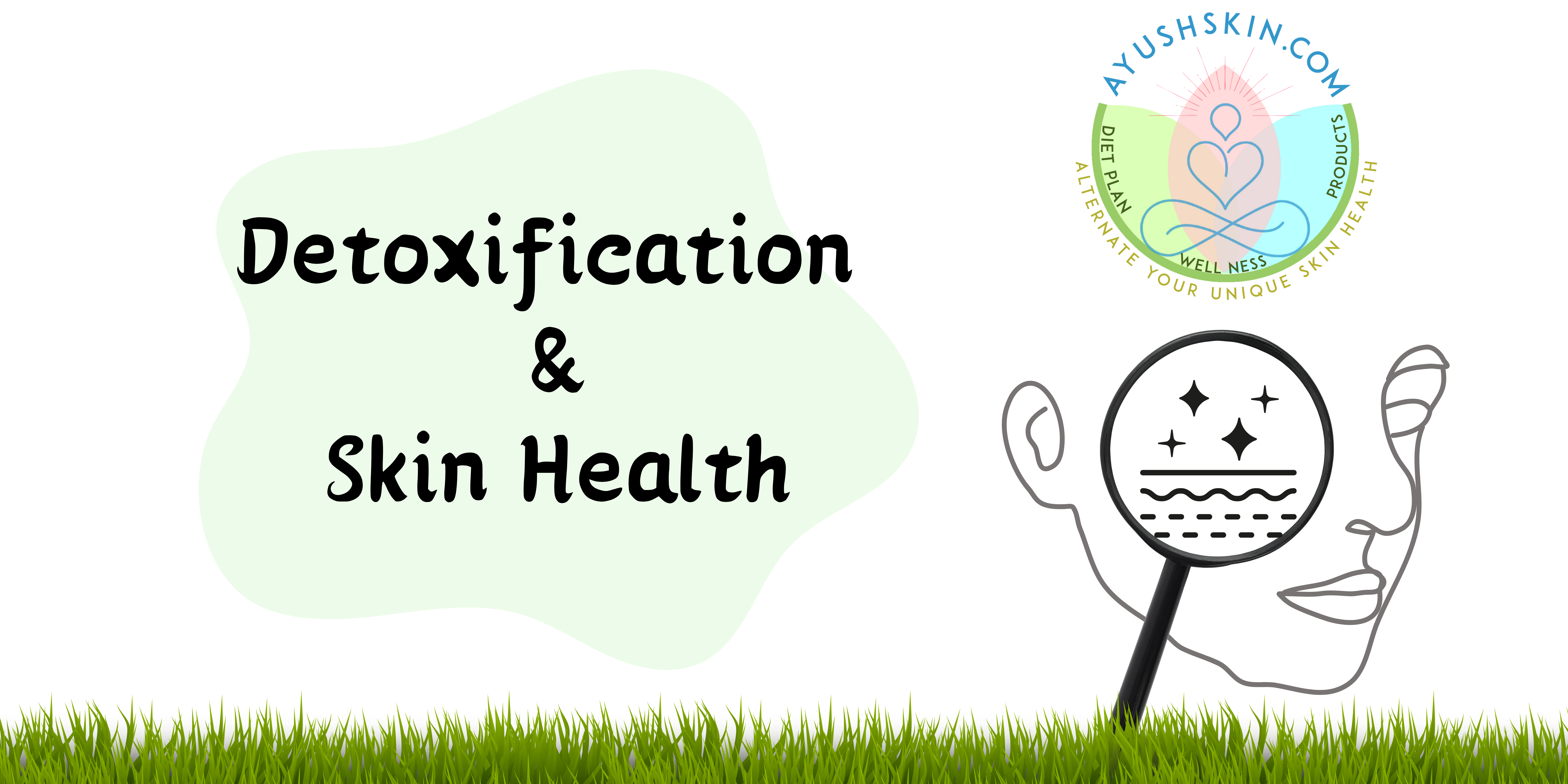Importance of Detoxification for Skin Problems.
Detoxification refers to the process by which the body eliminates or neutralizes potentially harmful substances, such as toxins or waste products. This is very important to help in natural skin problem recovery.
The body has its own natural detoxification systems, primarily the
- Liver
- Kidneys,
- Skin
- Lungs
- Lymphatic system
All these work Together to eliminate and Detox the body .
Detoxification can also refer to specific practices or treatments aimed at supporting or enhancing the body's natural detoxification processes. This can include dietary changes, fasting, drinking plenty of water, exercise, sauna therapy, and various detoxification protocols or programs. However, it's important to note that while some of these practices may support overall health and well-being, there is limited scientific evidence to support the effectiveness of many commercial detox products or extreme detox diets.
Disruption or impairment of any of these detoxification pathways can lead to accumulation of toxins in the body, potentially contributing to various health problems. Factors such as environmental toxins, poor diet, medications, alcohol, and certain diseases can affect the efficiency of detoxification processes. However, the body's detoxification systems are highly adaptable and often capable of restoring balance with appropriate support and interventions.
- Liver Detoxification: The liver is the primary organ responsible for detoxification. It metabolizes and neutralizes toxins through two main phases: Phase I and Phase II detoxification. In Phase I, enzymes in the liver (such as cytochrome P450 enzymes) convert fat-soluble toxins into intermediate metabolites, often making them more reactive. In Phase II, these intermediate metabolites are conjugated with water-soluble substances (such as glutathione, sulfate, or glucuronic acid), making them easier to excrete by the kidneys or bile.
- Kidney Filtration: The kidneys filter waste products, toxins, and excess substances from the blood to produce urine. This process involves the glomeruli, which filter blood, and the tubules, which reabsorb essential substances and excrete waste into urine.
- Skin Detoxification: The skin plays a role in detoxification through sweat. Sweat glands excrete water, electrolytes, and small amounts of waste products, including some toxins. Sweating is particularly important for regulating body temperature and eliminating certain substances, such as heavy metals.
- Lung Excretion: The lungs eliminate volatile toxins and waste gasses through respiration. When we breathe, oxygen is taken in, and carbon dioxide and other waste gasses are expelled. Some volatile toxins can also be eliminated through exhalation.
- Lymphatic System: The lymphatic system helps remove toxins and waste products from tissues and organs. Lymphatic vessels collect interstitial fluid, along with cellular waste and toxins, and transport them to lymph nodes for filtering. The filtered lymph is then returned to the bloodstream.
Factors affecting the Detoxification Process
Overall, maintaining effective detoxification pathways is essential for supporting overall health and well-being.
Balanced diet :
Diet plays a crucial role in supporting the body's natural detoxification .processes.Consuming a diet rich in essential nutrients, including vitamins, minerals, antioxidants, and phytonutrients, provides the body with the necessary cofactors and substrates for optimal detoxification. Nutrients such as vitamin C, vitamin E, selenium, zinc, and glutathione are particularly important for supporting detoxification enzyme activity and neutralizing free radicals generated during detoxification processes.Dietary fiber, found in fruits, vegetables, whole grains, legumes, and nuts, plays a vital role in promoting regular bowel movements and supporting digestive health. Adequate fiber intake helps to prevent constipation and promotes the excretion of toxins and waste products from the body through the stool.Sulfur-containing amino acids, such as cysteine and methionine, are important for synthesizing glutathione, a potent antioxidant and key player in detoxification processes.
Regular exercise:
Regular physical activity plays a vital role in supporting the body's natural detoxification processes by improving circulation, lymphatic drainage, sweating, respiratory function, liver health, and stress management. Incorporating regular exercise into one's lifestyle can enhance overall detoxification capacity
Increased Blood Circulation: Exercise increases blood flow throughout the body, including to the liver, kidneys, skin, and other organs involved in detoxification. Improved blood circulation enhances the delivery of oxygen and nutrients to cells and tissues, while also promoting the removal of metabolic waste products and toxins.
Adequate hydration : Adequate hydration is essential for supporting the body's natural detoxification processes by promoting kidney function, urinary excretion of toxins, digestive health, temperature regulation, and skin health. Maintaining proper hydration levels through regular water intake is crucial for overall detoxification and optimal health.
Minimizing exposure to environmental toxins : Harmful environmental factors can disrupt the body's detoxification processes by overloading detoxification organs, generating oxidative stress, impairing kidney function, disrupting gut microbiota, and dysregulating the immune system. Minimizing exposure to environmental toxins through pollution control, toxin avoidance, and lifestyle modifications is essential for supporting optimal detoxification
lifestyle interventions: Incorporating certain Lifestyle changes to boost up the detoxification process is very important .Some of the following lifestyle factors are mentioned in the below list .
- Improved Sleep Quality
- Intermittent Fasting or Cleansing
- Maintaining ideal Body weight .
- Focus on emotional wellbeing and Mental Health.
- Shift from Sedentary Lifestyle to Active Lifestyle.
Consequences of Compromised Detoxification Process
Impaired Organ Function: Toxins can interfere with the normal functioning of organs and systems, such as the liver, kidneys, and immune system. Over time, this can lead to organ dysfunction and an increased risk of chronic diseases, including liver disease, kidney disease, and autoimmune disorders.
Weakened Immune System: Toxins can suppress the immune system, makinthe body more vulnerable to infections and illness. Chronic exposure to environmental toxins has been associated with immune dysfunction and increased susceptibility to infections.
Long-Term Health Effects: Prolonged exposure to toxins and impaired detoxification can contribute to the development of chronic health conditions, such as cancer, neurodegenerative diseases, metabolic disorders, and cardiovascular disease. Additionally, toxin accumulation may exacerbate existing health conditions and reduce the body's ability to heal and recover.
Accumulation of Toxins: Without effective detoxification, toxins and waste products can accumulate in the body. This accumulation can occur in various organs and tissues, leading to cellular damage, inflammation, and oxidative stress.
Increased Oxidative Stress: Some toxins generate oxidative stress, which occurs when there is an imbalance between free radicals and antioxidants in the body. Oxidative stress can damage cells, proteins, and DNA, contributing to aging, inflammation, and the development of chronic diseases such as cancer and cardiovascular disease.


